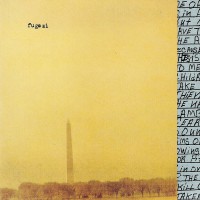I've always loved Fugazi's dynamic and more so, the unspoken 'rivalry' I place in my mind when listening to the alternating vocals of Ian MacKaye and Guy Picciotto. 13 Songs and "Waiting Room" are what I remember them most fondly for, but that doesn't discount just how powerful a record In on the Kill Taker was and still is. Many saw it as their step into the commercial stream of Billboard's 200 and a deserving one at that, but when I first heard and fully absorbed the record in 2000, the aggressiveness and diverse range of influences strewn into the album resonated the most. There's enormous energy infused and it showed why so many post-hardcore bands always list them atop their favourites.
MacKaye was the vocalist I leaned to more. Picciotto was great, but MacKaye's depth and range really stuck with me from the first time I heard their music. "Facet Squared" was emblematic in its slow intro, a riff that culminated into a crescendo of unrelenting punk. The dissonance of the guitars were what made post-hardcore and noise rock, well, post-hardcore and noise rock. MacKaye's gruff disposition was perfectly streamlined into the off-key melody cultivated throughout the album and "Returning The Screw" showed how versatile he really was. It played off in stark contrast to the opener in its grim, haunting tone. What punctuated this record furthermore was Brendan Canty's work on the kit. His drums echoed phenomenally. As a technically sound band, and that's quite an understatement if I were to leave it at that, this album really rings true as to why Fugazi are held in a talismanic light. You've heard bands like Thursday, AFI and At-The-Drive-In constantly make reference to them, and it's apparent how much MacKaye and Picciotto inadvertently helped mold the likes of Geoff Rickly and Cedric Zavala, if not in writing style, then in their musical delivery.
Fugazi showed that you didn't need to be the best vocalist out there to translate a message. Seeing them referenced in high esteem over the years showed how they were regarded, and Picciotto's slanted take on the mic added that extra edge and dimension. "Public Witness Champion" and "Smallpox Champion" demonstrated this. The spine of the record however wasn't the most enjoyable for me. There was a slight disjoint here and this disconnection, while it didn't level me off the album, did provide a break that I didn't need. Thank God for "Sweet and Low" to end that monotony. It broke the tempo back in perfectly for me. Even the album's art, design and packaging had that extra something and while not a conscious ploy to reinvigorate their sound, Fugazi never shied away from experimentation. They were all about steps forward and unsubdued music. "Cassavetes" had a jazzy effect embedded along with Joe Lally's eclectic, slapping basslines that were perfectly accompanied by slick chords.
There was conventional rhythm stymied into the album combined with syncopated riffs. Fugazi always blended such with near-perfection. There were subsequent allusions that with an emerging alternative rock scene in 1993, as well as a sparring grunge scene, both of these factors contributed significantly to Fugazi's ultimate push into the Billboard charts. Some saw it as a commercial breakthrough but if I were aware more of the scene back then, I wouldn't care. I'd still be romanced by the charm of "Great Cop" and "Instrument." MacKaye cut loose often and when he did, it was ballistic and clever.
Their cutting riffs, shredding guitars and overall musical camaraderie lent a lot to Fugazi's credibility and likeability, not to mention their view to eschew violence and embrace a straight-edge lifestyle. But to me, what they etched their name in most, was that delicate balance of spinning and incorporating a vast array of musical influences into their work, which showed when contemporary bands from a wide range of genres mentioned Fugazi as a key idol. Did Fugazi expose, revolutionize or encapsulate the essence of post-hardcore? Who cares. They made remarkably brilliant music. Simple as that. They set the bar high and such a standard is quite a feat to come close to ever again.
